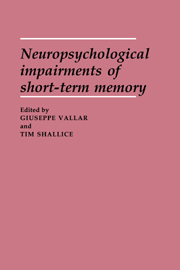Book contents
- Frontmatter
- Contents
- List of contributors
- Acknowledgments
- General introduction
- I THE FUNCTIONAL ARCHITECTURE OF AUDITORY–VERBAL (PHONOLOGICAL) SHORT-TERM MEMORY AND ITS NEURAL CORRELATES
- II PHONOLOGICAL SHORT-TERM MEMORY AND OTHER LEVELS OF INFORMATION PROCESSING: STUDIES IN BRAIN-DAMAGED PATIENTS WITH DEFECTIVE PHONOLOGICAL MEMORY
- III SHORT-TERM MEMORY STUDIES IN DIFFERENT POPULATIONS (CHILDREN, ELDERLY, AMNESICS) AND OF DIFFERENT SHORT-TERM MEMORY SYSTEMS
- 9 Developmental fractionation of working memory
- 10 Adult age differences in working memory
- 11 Lipreading, neuropsychology, and immediate memory
- 12 Memory without rehearsal
- 13 The extended present: evidence from time estimation by amnesics and normals
- IV PHONOLOGICAL SHORT-TERM MEMORY AND SENTENCE COMPREHENSION
- Name index
- Subject index
10 - Adult age differences in working memory
Published online by Cambridge University Press: 11 May 2010
- Frontmatter
- Contents
- List of contributors
- Acknowledgments
- General introduction
- I THE FUNCTIONAL ARCHITECTURE OF AUDITORY–VERBAL (PHONOLOGICAL) SHORT-TERM MEMORY AND ITS NEURAL CORRELATES
- II PHONOLOGICAL SHORT-TERM MEMORY AND OTHER LEVELS OF INFORMATION PROCESSING: STUDIES IN BRAIN-DAMAGED PATIENTS WITH DEFECTIVE PHONOLOGICAL MEMORY
- III SHORT-TERM MEMORY STUDIES IN DIFFERENT POPULATIONS (CHILDREN, ELDERLY, AMNESICS) AND OF DIFFERENT SHORT-TERM MEMORY SYSTEMS
- 9 Developmental fractionation of working memory
- 10 Adult age differences in working memory
- 11 Lipreading, neuropsychology, and immediate memory
- 12 Memory without rehearsal
- 13 The extended present: evidence from time estimation by amnesics and normals
- IV PHONOLOGICAL SHORT-TERM MEMORY AND SENTENCE COMPREHENSION
- Name index
- Subject index
Summary
Introduction
The notion that some degree of short-term memory impairment is typically found in healthy older people has been current for the last 30 years or so. Welford (1958) surveyed the results of several dual-task experiments and proposed that many of the deficits associated with the normal aging process – in memory, learning, reasoning, and perceptual–motor tasks – may have their basis in the reduced efficiency of short-term memory; in particular, it seemed that both the capacity of this memory store, and its ability to resist the interfering effects of other activities, declined in the course of normal aging. However, by the time that Craik (1977) reviewed the literature on age differences in memory, more techniques to measure short-term (or primary) memory were available, and it appeared that Welford's suggestion was either faulty or too general. Craik pointed out that age differences were minimal in such measures as digit span, the recency effect in free recall, and the slope of the Brown–Peterson function. A possible resolution of the apparent conflict is that age differences do not appear (or are slight) in areas where the task calls for relatively passive storage of some small amount of material and then for its retrieval in much the same form, whereas age differences are substantial when the subject must manipulate the material held, or actively rehearse one set of material while simultaneously perceiving or responding to further material (Craik, 1977).
This latter characterization is very similar to the concept of a “general working memory” as described by Baddeley (1986; this volume, chapter 2).
Information
- Type
- Chapter
- Information
- Neuropsychological Impairments of Short-Term Memory , pp. 247 - 267Publisher: Cambridge University PressPrint publication year: 1990
Accessibility standard: Unknown
Why this information is here
This section outlines the accessibility features of this content - including support for screen readers, full keyboard navigation and high-contrast display options. This may not be relevant for you.Accessibility Information
- 44
- Cited by
